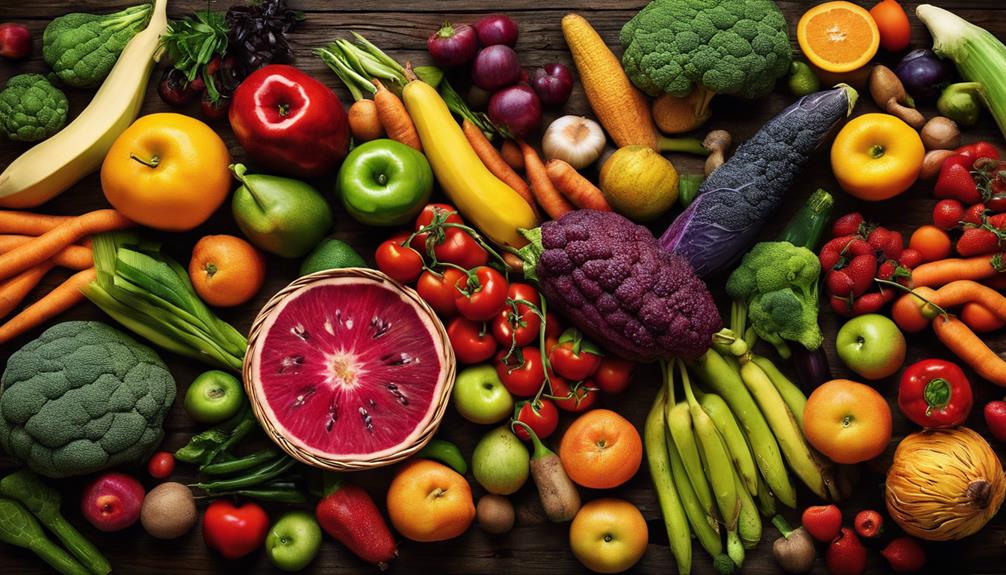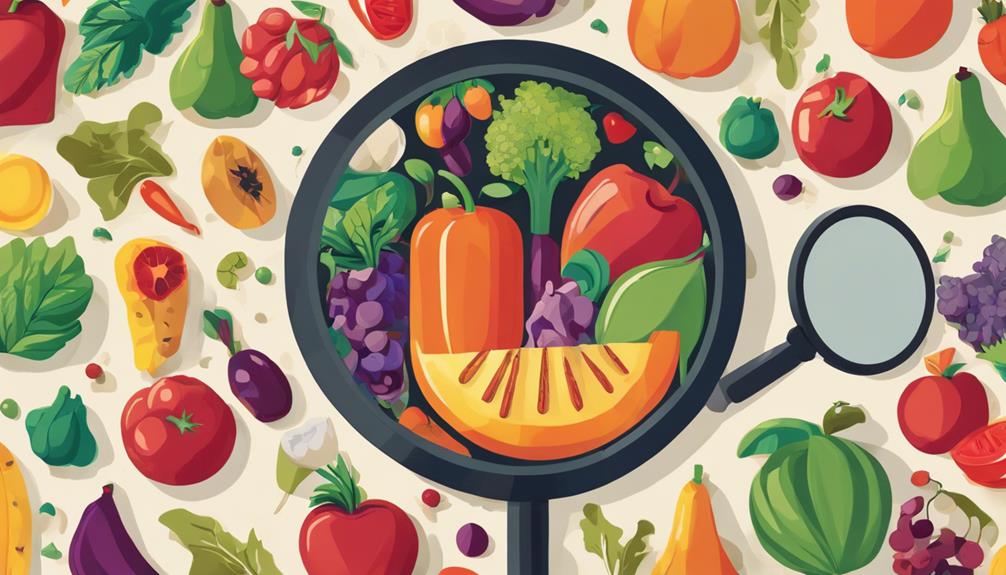The Benefits of Organic Foods
When it comes to your health and well-being, have you ever considered the advantages of choosing organic foods? The benefits extend beyond just what you put on your plate. From supporting local farmers to reducing environmental impact, organic foods offer a range of advantages that might make you rethink your grocery choices.
Key Takeaways
- Enhanced nutritional value with higher levels of vitamins and minerals.
- Reduced exposure to harmful pesticides linked to health issues.
- Support for small-scale farmers and local economies through fair trade practices.
- Improved animal welfare standards with access to outdoors and natural diets.
- Environmental sustainability with eco-friendly farming practices and preservation of natural resources.
Enhanced Nutritional Value
When it comes to the benefits of organic foods, one can't overlook the aspect of enhanced nutritional value. Organic foods are known for their increased vitamins and enhanced minerals compared to conventionally grown produce. Studies have shown that organic fruits and vegetables tend to have higher levels of certain nutrients, such as vitamin C, iron, magnesium, and phosphorus. These nutrient levels are often influenced by the healthier soil conditions found in organic farming, which promote the growth of plants with higher nutritional content.
For example, organic tomatoes have been found to contain higher levels of vitamin C and antioxidants compared to conventionally grown tomatoes.
Similarly, organic spinach has been reported to have increased levels of minerals like iron and magnesium.
Reduced Exposure to Pesticides
With organic foods, one significant benefit is the reduced exposure to pesticides. Choosing organic products can lead to improved health benefits due to the lower pesticide residue levels found in organic produce compared to conventionally grown foods. Pesticides have been linked to various health issues, including cancer, hormone disruption, and neurological problems. By opting for organic foods, you're reducing your intake of these harmful chemicals, thereby lowering your risk of exposure to potential health hazards.
Moreover, the environmental impact of decreased pesticide use is significant. Organic farming practices focus on natural methods of pest control, such as crop rotation, beneficial insect habitats, and composting. These methods not only protect human health but also help preserve biodiversity, reduce soil erosion, and promote sustainable agriculture.
Support for Small-Scale Farmers
Organic foods not only benefit your health and the environment but also provide crucial support for small-scale farmers. Choosing organic products means supporting fair trade practices and fostering community support. By opting for organic foods, you contribute to a system that values the hard work of small-scale farmers and ensures they receive fair compensation for their efforts.
| Benefits of Organic Foods for Small-Scale Farmers | ||||
|---|---|---|---|---|
| 1. Fair Trade Practices | 2. Direct Community Support | 3. Strengthening Local Economies | 4. Empowering Farmers | 5. Environmental Sustainability |
Fair Trade Practices: Organic farming often involves fair trade agreements, ensuring that farmers receive a fair price for their produce.
Direct Community Support: Buying organic foods from local farmers fosters a sense of community and strengthens local economies.
Strengthening Local Economies: Supporting small-scale farmers through organic purchases helps keep money within local communities, benefiting everyone.
Empowering Farmers: Organic farming empowers small-scale farmers by providing them with a sustainable livelihood.
Environmental Sustainability: By supporting organic farming, you contribute to environmental sustainability and the preservation of natural resources.
Improved Animal Welfare Standards
Enhancing animal welfare standards in food production is a crucial aspect of promoting ethical practices and sustainability in agriculture. When choosing organic foods, you support ethical sourcing and contribute to the well-being of animals involved in the production process. Here are some key improvements in animal welfare standards within organic farming:
- Access to Outdoors: Animals are provided with access to outdoor areas where they can engage in natural behaviors.
- No Hormones or Antibiotics: Organic farming prohibits the use of hormones and antibiotics in animal feed, promoting healthier livestock.
- Spacious Living Conditions: Livestock raised organically are often given more space to move around freely.
- Natural Diet: Animals are fed organic, natural diets that are free from synthetic pesticides and genetically modified organisms.
- Stress Reduction: By prioritizing animal welfare, organic farms aim to minimize stress in livestock, leading to happier and healthier animals.
Choosing organic foods not only benefits your health but also supports a more compassionate approach to animal agriculture.
Environmental Sustainability
Promoting environmental sustainability in food production is paramount for preserving our planet's resources and ensuring a healthier future for generations to come. Sustainable agriculture, which forms the foundation of organic farming, focuses on eco-friendly practices that minimize harm to the environment. By avoiding synthetic pesticides and fertilizers, organic farming helps protect soil quality, reduce water pollution, and conserve biodiversity.
Through techniques like crop rotation, cover cropping, and natural pest management, organic farmers work in harmony with nature, promoting long-term soil health and ecosystem balance. These practices not only benefit the environment but also contribute to the overall well-being of the planet.
Choosing organic foods supports sustainable agriculture and encourages the growth of a more environmentally friendly food system. By opting for organic products, you aren't only nourishing your body with wholesome, chemical-free foods but also contributing to the preservation of our planet for future generations. Make a positive impact on the environment by supporting eco-friendly farming practices through your food choices.
Better Taste and Flavor
When it comes to the culinary experience, the quality of taste and flavor is a crucial aspect that can elevate your meals to a whole new level. Organic foods offer a range of culinary benefits that enhance the sensory experience and cater to consumer preferences driven by market demand. Here are five reasons why organic foods excel in taste and flavor:
- Richer Flavors: Organically grown produce tends to have more robust and intense flavors due to the nourishing soil they're grown in.
- Natural Sweetness: Fruits and vegetables grown organically often have a more pronounced natural sweetness compared to conventionally grown counterparts.
- Enhanced Aromas: The lack of synthetic pesticides and chemicals allows the natural aromas of organic foods to shine through, enhancing the overall dining experience.
- Complex Profiles: Organic meats and dairy products are often noted for their complex flavor profiles, adding depth to your dishes.
- Freshness: Organic foods are typically fresher since they're often locally sourced and have shorter transportation distances, preserving their taste and quality.
Organic foods not only meet consumer preferences but also deliver a superior taste and flavor profile that can truly elevate your culinary creations.
Higher Levels of Antioxidants
Organic foods not only offer a delightful culinary experience with their rich flavors and natural sweetness but also provide a nutritional advantage with higher levels of antioxidants. These antioxidants play a crucial role in protecting your cells from damage caused by free radicals, which are unstable molecules that can lead to various diseases. By consuming organic foods rich in antioxidants, you're actively supporting your body's defense system, contributing to disease prevention and overall well-being.
Antioxidants found in organic foods have been linked to longevity benefits, supporting a healthier and potentially longer life. Research suggests that a diet high in antioxidants can help reduce the risk of chronic conditions such as heart disease, cancer, and neurodegenerative disorders.
No Synthetic Hormones
With organic foods, you can rest assured knowing that they're free from synthetic hormones. When it comes to hormone-free benefits, organic animal products stand out for various reasons:
- Healthier Choice: By choosing organic animal products free from synthetic hormones, you reduce your exposure to potentially harmful chemicals.
- Natural Growth: Organic farming practices promote the natural growth and development of animals, ensuring they aren't artificially manipulated with hormones.
- Environmental Impact: Choosing organic animal products helps support sustainable farming methods that are better for the environment and animal welfare.
- Quality Assurance: Organic certification guarantees that the animals were raised without synthetic hormones, providing a higher quality product.
- Personal Well-being: Consuming organic animal products free from synthetic hormones may contribute to your overall well-being by avoiding unnecessary chemicals in your diet.
When you opt for organic animal products, you not only support your health but also encourage environmentally friendly and ethical farming practices.
Lower Risk of Antibiotic Resistance
Moving on from the benefits of organic animal products being free from synthetic hormones, another significant advantage is the lower risk of antibiotic resistance associated with organic foods.
Conventional farming practices often involve the routine use of antibiotics in animal feed to promote growth and prevent diseases in crowded conditions. This overuse of antibiotics can lead to the development of antibiotic-resistant bacteria, posing a serious threat to human health.
Organic farming, on the other hand, follows sustainable agriculture practices that prioritize animal welfare and natural disease prevention methods. By avoiding the routine use of antibiotics, organic farmers help reduce the emergence of antibiotic-resistant pathogens, thereby safeguarding both animal and human health.
The lower risk of antibiotic resistance in organic foods aligns with the principles of alternative medicine, which emphasize preventive care and natural remedies. Choosing organic products not only supports sustainable agriculture but also contributes to a healthier food system for you and future generations.
Organic Farming Practices
When considering sustainable and environmentally friendly agricultural practices, it's essential to delve into the methods and principles underlying organic farming. Organic farming practices focus on maintaining soil health and promoting nutrient retention, ensuring the long-term sustainability of food production. Here are some key aspects of organic farming methods:
- Crop Rotation: By rotating different crops seasonally, soil health is preserved, pests are controlled naturally, and essential nutrients are replenished.
- Composting: Organic farmers use compost made from natural materials to enrich the soil, improve its structure, and enhance nutrient levels.
- Cover Cropping: Planting cover crops like clover or rye helps prevent soil erosion, suppress weeds, and boost soil fertility.
- Avoiding Synthetic Chemicals: Organic farmers steer clear of synthetic pesticides and fertilizers, relying instead on natural methods to manage pests and enrich the soil.
- Conservation Tillage: Minimal tillage reduces soil disturbance, preserves soil structure, and minimizes erosion, contributing to overall soil health.
These practices collectively contribute to the sustainability and health of the environment, making organic farming a vital component of a healthier food system.
Reduced Impact on Biodiversity
Organic farming practices not only benefit soil health and food sustainability but also play a significant role in reducing the impact on biodiversity. By promoting wildlife conservation and sustainable agriculture, organic farming methods help protect and enhance the natural habitats of various species. Ecosystem preservation is a key component of organic farming, as it avoids the use of synthetic pesticides and fertilizers that can harm wildlife and disrupt the balance of ecosystems.
Organic certification ensures that farmers adhere to strict guidelines that support biodiversity by promoting practices such as crop rotation, mixed planting, and the preservation of natural habitats within and around farms. These methods create a more harmonious environment where diverse plant and animal species can thrive, contributing to overall ecosystem health.
Choosing organic foods not only benefits your own health but also supports a farming system that prioritizes biodiversity conservation. By making informed choices about the food you consume, you contribute to a more sustainable and environmentally friendly agricultural approach.
Healthier Choice for Children
For families seeking healthier options for their children, organic foods offer a compelling choice. When it comes to your little ones, opting for organic can have significant benefits for their overall well-being. Here are some reasons why organic foods are a healthier choice for children:
- Boosts the Immune System: Organic foods are free from harmful pesticides and chemicals, which can help strengthen your child's immune system.
- Supports Cognitive Development: The nutrients found in organic foods, such as omega-3 fatty acids and antioxidants, can aid in cognitive development and improve brain function.
- Reduces Exposure to Hormone Disruptors: Organic foods are produced without synthetic hormones, reducing the risk of hormone disruptors that can negatively impact children's health.
- Promotes Healthy Growth: Organic foods are often fresher and packed with more essential vitamins and minerals, supporting your child's growth and development.
- Enhances Overall Health: By choosing organic, you're providing your children with food that's nutritionally superior and free from harmful additives that could compromise their health in the long run.
Frequently Asked Questions
Can Organic Foods Prevent Allergies in Children?
Yes, organic foods can potentially help prevent allergies in children by supporting a strong immune system and promoting healthy childhood development. Research suggests that the lack of pesticides in organic foods may play a role in reducing allergy risk.
Are Organic Foods More Affordable Than Conventional Foods?
When comparing cost, organic foods may be pricier than conventional options. However, the nutritional value and health benefits they offer can outweigh the difference in price. Consider the long-term benefits for your health and wellbeing.
Do Organic Foods Have a Longer Shelf Life?
Absolutely! Organic foods tend to have a longer shelf life compared to conventional options. This is due to their higher nutritional value and minimal processing, which also benefits the environment by reducing waste and preserving freshness.
Can Organic Farming Help in Combating Climate Change?
Absolutely, organic farming can significantly combat climate change by reducing environmental impact. Sustainable agriculture methods promote soil health, biodiversity, and carbon sequestration. Choosing organic foods supports a healthier planet for future generations.
Are Organic Foods Less Likely to Cause Digestive Issues?
When you choose organic foods, you may experience improved digestion due to their reduced pesticide content. This can lead to less inflammation in your gut, making it easier for your body to process and absorb nutrients effectively.
Conclusion
In conclusion, choosing organic foods is like taking a bite of a ripe, juicy apple straight from the orchard – fresh, pure, and bursting with flavor. By opting for organic options, you not only nourish your body with essential nutrients but also support a more sustainable and ethical food system. So next time you're at the grocery store, remember the benefits of organic foods and make a conscious choice for your health and the environment.















